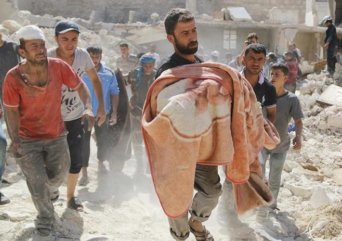- About
- Topics
- Picks
- Audio
- Story
- In-Depth
- Opinion
- News
- Donate
- Signup for our newsletterOur Editors' Best Picks.Send
Read, Debate: Engage.
The conflict in Syria reached its fifth birthday this week as the Syrian government and major Syrian opposition groups met in Geneva at United Nations-led peace talks.
According to the Syrian Center for Policy Research, an independent Syrian research organization, the death toll from the conflict reached 470,000 Syrians as of February 2016.
But with Putin announcing the withdrawal of Russian troops in support of Assad's regime, there is small hope this could be the break the conflict needs.
The spread and intensification of fighting has led to a dire humanitarian crisis, with 6.6 million internally displaced people and 4.6 million seeking refuge in neighboring countries, according to the UN Office for the Coordination of Humanitarian Affairs.
Human Rights Watch urged the International Syria Support Group (ISSG), a group of countries co-chaired by the United States and Russia working to find a solution for the Syria crisis, and the UN special envoy Staffan de Mistura, to ensure that the talks include substantive discussions on ways to end rampant human rights abuses and ensure justice for the victims.
“While it is urgent to stop the killing and ensure aid delivery, any resolution to the conflict that is going to last must also ensure justice for Syria’s victims,” said Nadim Houry, deputy Middle East director. “There should be no immunity for anyone linked to serious crimes, and after five years of devastating conflict, there should be no deal that ignores the victims.”
While a cessation of hostilities negotiated on February 12 has reduced the daily toll of casualties and put access to humanitarian aid at the forefront of negotiations, violations of the cessation still makes it difficult for nongovernmental groups to deliver aid to besieged areas. The Syrian government has also hindered the process of delivering aid to besieged areas by delaying permission for the UN and other aid organizations to enter besieged towns to deliver lifesaving aid, aid agencies have reported.
“Syria’s inferno began five years ago after security forces shot at protesters and tortured children in Daraa,” Houry said. “For this conflict to end, Syria’s victims need to feel that the root causes have been addressed.”
